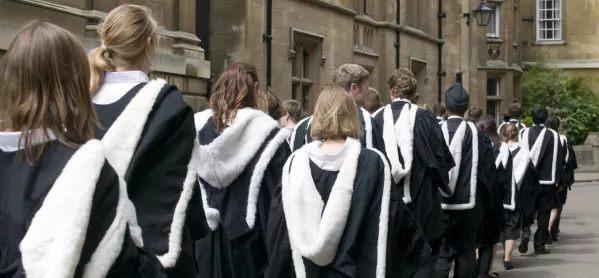Last week, I delivered a lecture on vocational education and training to students at Oxford University’s Master’s in Learning and Teaching (MLT). It was great, the students were sitting in the same place as I had six years previously, but akin to my cohort, there was only one teacher who had come from FE.
Why more FE lecturers don’t choose Oxbridge? Lots of state-sector teachers choose Oxbridge, as do leaders. There is a push to do something about it: £4.5 million was pledged for FE leaders’ development through Oxford Saïd Business School last month. So why are FE lecturers reluctant to study there? Surely we’re not falling for that “it’s not the right place for people like us” trope?
Our underrepresentation at places like Oxbridge has repercussions for the sector. Let’s take for example a professor from this type of institution, who specialises in further education referring to it as the second chance sector. This isn’t a term that is generally seen as acceptable to many in the sector: it’s certainly not one I like.
Background: £14m to improve FE leadership and governance announced
News: 90% white, 67% male: The WorldSkills diversity crisis
Opinion: Why all college lecturers should be paid £30k - or more
If you are teaching ESOL, are these people having a second chance at learning English? Are students on fisheries and fish management courses or motor vehicle courses there because they failed to pass these qualifications at school so they’ve come to retake at college? No, much to the surprise of some, they have come to college because they want to be a mechanic or work in fisheries.
The implication of second chance is that they haven’t quite done enough, or been clever enough the first time round to do proper qualifications. This then also relegates the knowledge, and those who possess it (the teaching staff) to being in some way second best too. It would not be a long leap from this view to simplistic (but thankfully only occasional) explanations of our practice: that our teaching is basic and instrumental, that we simplistically teach elementary concepts in unchallenging ways, that we unthinkingly respond to policy, we do as we are told, when we are told, in the manner we are told to do it. Which suggests that our practice doesn’t need the research and theorising we know it deserves.
If we don’t ever attend Oxbridge to learn or research then we as a sector become neglected within those, they won’t have the staff to supervise us, so won’t get involved in researching in the sector or get involved in collaborative endeavours. I am willing to bet that Cambridge University have more staff who are specialists in Chinese education than the English FE system. To me, this just seems wrong.
‘We limp on misunderstood and underfunded’
But why is all this particularly problematic in the case of my Oxbridge Professor? Well, whether you like it or not, they tend to be those high-profile academics who get to sit at the top table, they’re the ones who are invited to and listened to at policy forums or by government. If government advisors, who are unlikely to have had an FE experience themselves, are sold the second chance line then it gives the impression that there is little benefit in funding or researching us properly. So we limp on misunderstood and underfunded.
I do genuinely believe we make the problem worse if we argue that Oxbridge is not the right space for us. We should be looking at changing rather than replicating ideas of where we belong and in which spaces are the right ones for our voices to be heard.
By engaging in these spaces we can challenge the use of language like second chance (although the Dancing Princess series of books have gone a long way to challenge this) and look for those others inside the space who can work as allies and co-researchers. More than this, we are then able to role model and demonstrate what talent there is within the sector and our work to challenge any outdated preconceptions or ideas.
Sam Jones is a lecturer at Bedford College, founder of FE Research Meet and was FE Teacher of the Year at the Tes FE Awards 2019





